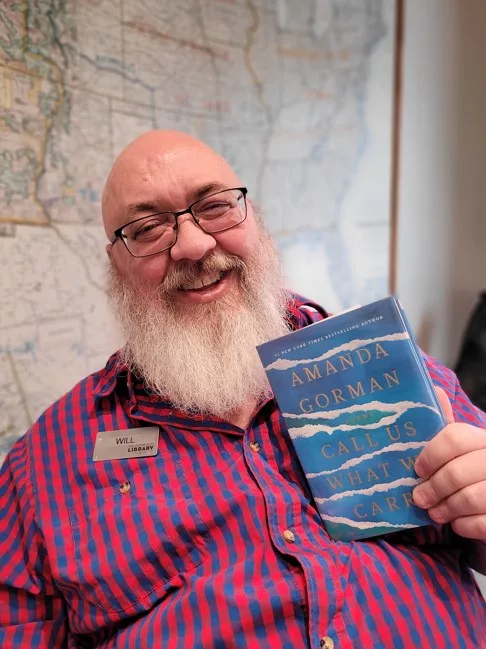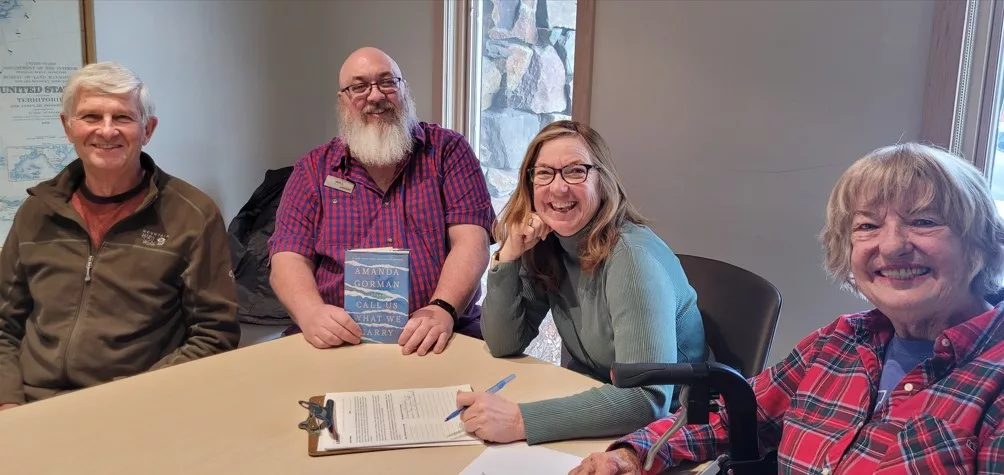
Information Systems Manager, Will Duke, recommends Call Us What We Carry by Amanda Gorman.
I have never read a book of poetry before. Oh, I’ve read poems. Lots of poems. I’ve read poems from collections, from the Norton Anthology. I’ve read poems from the Internet. I’ve read poems from student poets. I’ve read poems on splotchy xeroxed copies of copies.
I have always thought of poems as standalone, self-contained things. In fact, I don’t know that I can “read” a poetry book. I never get a poem in one pass. I study poems. I don’t start to “get it” until I’m 3 or 4 reads in, at least. The words fly by too quickly, and I start to think about rainbows and unicorns, or something else shiny, and the poem is finished and I’m reading the next one.
Isn’t poetry the perfect literary medium for the modern age? They can be read quickly, 15 seconds of attention, tik tok the time has passed and so has the poem. But maybe that’s nothing new. Led Zepplin famously didn’t release singles; the album was the work. Listen to the album, they said.
It is at this moment I realize the secret truth of poetry: It must be read aloud.
When I started to read Call Us What We Carry by Amanda Gorman, I flipped through the pages, one poem after another. The poet was in a pandemic and struggling with all that meant. “It is easy to harp / harder to hope. … The glorious was not made to be piecemeal,” rises from the page and demands my attention. A quick read wasn’t going to work. I had to go back and read the whole poem again. Then I wanted to hear it. At this moment I realize the secret truth of poetry: It must be read aloud.
I start again, supporting each poem with my voice. It slows me down. The sound of my voice resonates for me, and I start to feel the rhythm—not just of the individual words, or even the poem, but the ebb and flow of the book itself.
I turn the book sideways to read a poem shaped like a fish. I read about people, demons’ gifts, and nature in a vase where we can “lay it down”. I find hope in the poems: “But there’s something different on this golden morning / Something magical in the sunlight, wide and warming.”
Gorman uses any tool to make a poem work: form, meter, rhyme, figurative language, sound devices. She speaks to our conscience, our heart, our sadness, our hopes and our dreams. Her poetry is creative and huge and wonderful.
I recommend Gorman without reservation. She deserves her title as the first National Youth Poet Laureate. Try reading this book out loud, or not, as you deem fit, but read it. And then talk about poetry. Share what you love with those you love.
Which reminds me: Every Thursday I lead “Brown Bag Poetry” in the Library’s Learning Commons. How and why the Library IS Manager leads the poetry discussion is a collection of stories for another day. Today, I wanted to invite you to come hang out with us on Thursdays at 11:30 a.m. right here at the library. You’re welcome to bring lunch, if you’d like. On January 19, 2023, we’ll be talking about Amanda Gorman.
Find it in print, ebook, and eaudiobook here.
Brown Bag Poetry
Bring your own lunch and nestle in for some great conversation, led by the Library’s information systems manager (who has the heart of a poet): Will Duke.
Thursdays at 11:30 a.m. in the Learning Commons.
In the words of C.S. Lewis: “Eating and reading are two pleasures that combine admirably.”
We couldn’t have said it better!

